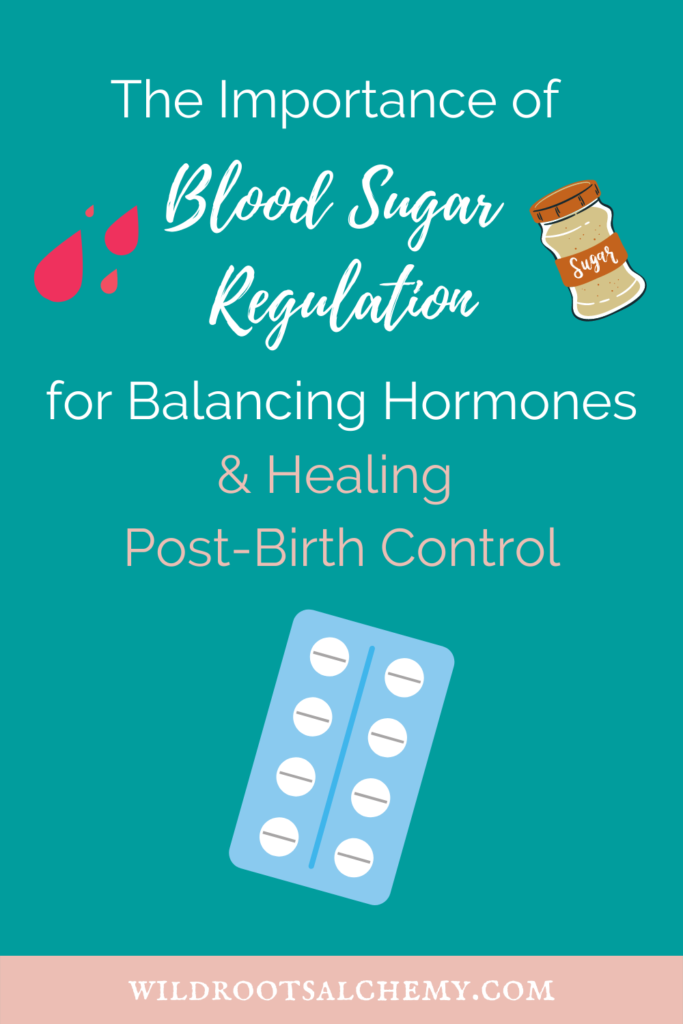
In addition to optimizing detoxification pathways and supporting your nervous system, blood sugar regulation could be the MOST important part of balancing your hormones and healing from post-birth control symptoms like acne and amenorrhea.
Why? Your blood sugar and insulin levels are intimately connected to the health of your hormones, including estrogen, progesterone, and testosterone. Even low-level insulin resistance impacts the production of your pituitary hormones (like FSH & LH), thus throwing off the balance of your sex hormones. Conversely, the more your sex hormones become imbalanced, the more that negatively affects your blood sugar regulation and insulin sensitivity. (“Vicious cycles” are the rule in medicine, not the exception!)⠀
But I hear you saying, “I don’t have diabetes or high blood sugar!” I’m sorry to say, but it’s very likely that you have some degree of metabolic dysfunction and blood sugar dysregulation, especially if you’ve been on hormonal birth control. A recent study showed that only 12% of American adults are metabolically healthy! This means that 7 in 8 adults have some sort of metabolic dysfunction, including insulin resistance.
Insulin resistance is sneaky. Blood sugar dysregulation often starts out with peaks of high blood sugar followed by a crash as insulin surges to compensate for the higher blood sugar levels, wisely trying to keep your blood sugar in a healthy range. Eventually your cells get tired of all that extra glucose and put up some resistance to insulin, leading to insulin resistance. Eventually the insulin wins and the glucose in your bloodstream gets into the cell, which can lead to dramatic dips in blood sugar and give you symptoms of low blood sugar, like shakiness, lightheadedness, and that “hangry” feeling.
How to Optimize Blood Sugar Levels and Increase Insulin Sensitivity
There are a lot of ways to optimize blood sugar levels and insulin sensitivity, but it really comes down to a healthy diet and lifestyle.
Here are my key tips to improve your glucose metabolism:
- Engage in movement of ALL kinds. I’m talkin’ aerobic workouts, high-intensity training, and strength training. Dance, hike, lift weights, shake that booty…and you could even Jazzercise if you wanna. No judgment!⠀
- Work out in a fasted state to optimize insulin sensitivity⠀
- Hike at high altitude (Colorado folks, you’ve got this one down!)⠀
- Avoid snacking in between meals and late at night⠀
- Focus on vegetables with each meal (half your plate)
- Lower your consumption of high-glycemic and simple carbohydrates, including white and whole wheat bread, white rice, white potatoes, instant oats, etc
- Avoid sugary drinks like soda and sweetened beverages
- Get a solid 7-8 hours of sleep each night⠀
- Eat magnesium-rich foods, like leafy greens, nuts & seeds (magnesium increases insulin sensitivity)⠀
- Add cinnamon, garlic, ginger, and turmeric to your meals, since these herbs help to regulate blood sugar⠀
- Eat bitter foods like dandelion greens as they help regulate insulin response
How do you keep your blood sugar in balance? Comment below!





